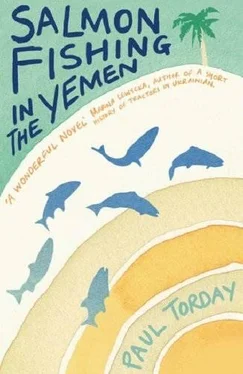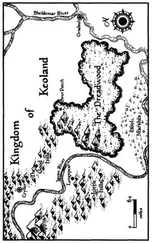I remember shouting at the top of my voice to the sheikh and the prime minister to get out, but the growing noise of the river and the hiss as the rain struck the surface of the water drowned out the sound of my voice. Colin saw the change in the river, saw the colour go from clear to brown and heard the menacing change in its song. He knew exactly what was happening but he still waded out into the river to try and save his master. It was calculated heroism. Someone should give him a medal. But too much happened that day, and Colin’s gallantry has been forgotten by most. But not by me.
I turned and shouted at Peter Maxwell to do something, but Peter’s face was white and strained with fear, and I don’t think he heard me. He started scrambling up the bank to get away from the river. The security men all knew that something was wrong, but they hadn’t worked out where the danger was. They thought it would come from the ridges above; they thought in terms of a human enemy, not a natural one. They were looking the wrong way.
Then there was a flash, and a shot was fired from somewhere. That distracted the security people even further. I heard afterwards that one of the sheikh’s bodyguards had been shot, but I never found out why. I didn’t see it. I was looking upriver and screaming at the prime minister to get out of the water.
Then I saw the wave come round the corner, about 300 metres away, and I thought we would all die. It was a surge about ten feet high, brown and white, coming towards us at the speed of an express train and making much the same sort of noise. In that moment I remember thinking, I hope the salmon don’t all get swept downstream, and then my own instincts took over and the next thing I remember was hanging on to a boulder at the top of the bank while the water tugged at my feet.
When the waters receded and most of the security people and the sheikh’s bodyguard had headed off downstream to see if they could find the bodies, I stood by the mouth of the channel feeding salmon into the wadi. I watched fish after fish enter the flow, turn as it smelt the water, and head upstream. I stood there without moving for a long time, and my heart was too full to speak. At first a few journalists and TV people came down and tried to get me to comment on what had just happened, but they weren’t interested in my salmon. They only wanted to talk about the accident and the prime minister. They weren’t interested either in what had happened to Colin or to the sheikh. I had nothing to say to them. After a while they went away, and an hour or two later I heard one of the Chinooks lift off, taking them all back to Sana’a to file their stories.
When the last salmon had left Holding Basin N°1, I sat on a flat rock by the water’s edge. The rain had stopped, and between ragged clouds the sun sank lower in the sky. From time to time I glanced over at the construction site, to see what was going on. I saw Peter Maxwell, a hundred yards or so away, talking endlessly into a mobile phone. I wondered what was so important until I remembered about the prime minister. I sat on the stone, and I thought about the project and the part I had played in it. No matter what happened to me now, they could not take this away from me. This was the greatest achievement of my life. It was not mine alone, but I knew that without me it could not have happened. I found myself wishing that Harriet could have been there, missing her dreadfully, because it was her achievement too, and this would have been her day too. But of course then she would have seen the sheikh being swept away. She had been right when she spoke of her foreboding. And I wished the sheikh could have been there so that I could have shared this achievement with him.
There was a shout from far upstream, and I saw one of the Yemenis who had gone further upstream to fish come running at top speed down the track. It was Ibrahim, our driver, one of the sheikh’s men. He saw me and screamed, ‘Dr Alfred! Dr Alfred!’
He ran towards me and I saw that he was carrying a dead salmon in his arms, nursing it like a baby. He must have abandoned his rod when he landed the fish. When he came near I saw that he didn’t yet know what had happened. He might even have been fishing above the plug. At any rate, he had caught a salmon. It was bright silver and weighed, I would guess, about ten pounds. A good fish, an excellent fish. Ibrahim’s face wore a huge smile, and he cried, ‘Dr Alfred! I have one fish!’
We embraced and slapped each other on the back, and the tears of happiness ran down our cheeks. The fish had fallen into the dust and Ibrahim bent to pick it up, still laughing at his luck. It was the first and, for all I know, the last salmon ever to be caught on the fly in the Yemen. At any rate, I have never heard of any other being caught or even seen swimming in the wadi since that marvellous, terrible day.
Then I had to tell Ibrahim about the sheikh.
Later on, as dusk was falling and the rock walls around us turning violet, the search parties trudged back up the canyon. In the endless wilderness of rock and stone, of vertical cliffs and holes through the riverbed into chasms below that formed the lower sections of the wadi, they never found the bodies. I think they were probably swept down a sinkhole into the aquifer itself, and there, in a sunless sea, rest the bodies of Jay Vent, politician, Colin McPherson, matchless gillie, and the Sheikh Muhammad ibn Zaidi bani Tihama, the almost holy man who created the Yemen salmon project.
Peter Maxwell came over to me. His face was still white, his eyes red, and his mouth set in a bitter, miserable twist. He said, ‘I hope you’re happy now.’
‘Yes,’ I said, ‘in many ways it has been an enormous success, though I wish with all my heart we could have avoided loss of life. But, if we are objective about this, Peter, we have achieved everything we set out to achieve from a scientific point of view. The big question is what will happen to the project now the sheikh is dead. You must help me find out who is in charge here now.’
Peter Maxwell stared at me for along time without speaking. Behind him I saw the security team climbing into the second Chinook.
‘I’ll tell you what will happen,’ he said. ‘Your project is finished. You are finished. And I’m finished. You should have known this would happen. You should have known…’
He began to sob, and I touched his arm to comfort him, but he shrugged me off violently. ‘You’ve killed the best man in the world, one of the greatest men who ever lived, and you’ve ruined my life at the same time. And all you can think of are your bloody fish.’
He turned away and stumbled towards the helicopter. A moment later, it took off, and I never saw Peter Maxwell again.
Interrogator:
Did Peter Maxwell or any other representative of the prime minister’s office contact you after your return to the UK? Has there been any attempt to influence your evidence to us in any way?
Alfred Jones:
When I got back to the UK I had become a non-person. When I turned up at Fitzharris & Price to discuss the ongoing management of the project I found that my job there was over. The sheikh’s heirs, whoever they were, did not share his enthusiasm for the project. The funding had been terminated before I even reached the UK. One of the partners in Fitzharris & Price met me in reception when I arrived in St James’s Street to pick up the threads and start work again. He handed me a letter from the firm of accountants who had been managing the finances of the project. The letter thanked me for my efforts in not many more words than those and enclosed a cheque for the next three months’ salary.
I read the letter then looked at Harriet’s colleague.
‘Is that it?’ I asked him. He shrugged his shoulders and said, ‘The rest of us never knew much about it. Grateful while it lasted of course, but we knew it couldn’t go on for ever. It was always Harriet’s baby, and she seems to have resigned her partnership.’
Читать дальше












